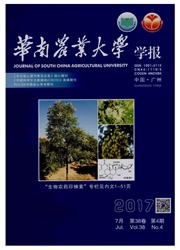

 中文摘要:
中文摘要:
【目的】了解广州市售肉类食品源大肠埃希菌的污染和耐药情况。【方法】自2011年7月至8月,从广州市各大农贸市场和超市采集市售肉类样品310份,其中猪肉253份,鸡肉57份。采用选择性培养基分离鉴定大肠埃希菌Escherichia coli,琼脂稀释法测定大肠埃希菌对19种抗菌药物的最小抑菌浓度(MIC)。【结果】310份样品中共分离到213株大肠埃希菌,分离率为68.7%,其中猪肉源177株,鸡肉源36株。受试菌株对复方新诺明、链霉素和四环素的耐药率超过75.0%,对氨苄西林、萘啶酸、氯霉素、新霉素、氟苯尼考、磷霉素、环丙沙星、安普霉素、恩诺沙星、庆大霉素和头孢唑啉的耐药率为10.0%~60.0%,而对头孢西丁、头孢曲松、头孢他啶、黏菌素和阿米卡星表现较为敏感,耐药率小于5.0%。鸡肉源大肠埃希菌对头孢唑啉、头孢西丁、头孢曲松、头孢他啶和磷霉素的耐药率均高于猪肉源大肠埃希菌,差异极显著(P〈0.01)。213株大肠埃希菌中82.2%为多重耐药菌。【结论】广州市售肉类食品存在较为严重的多重耐药大肠埃希菌污染,且鸡肉源大肠埃希菌耐药性较猪肉源大肠埃希菌严重。
 英文摘要:
英文摘要:
【Objective】To understand the contamination status and antimicrobial activity of Escherichia coli in retail meat sold in Guangzhou.【Method】We collected 310 meat samples including 253 retail pork and 57 chicken meat from markets and supermarkets in Guangzhou from July to August,2011. E. coli strains were isolated and identified using the selective media. The susceptibilities of E. coli strains to 19 common antibiotics represented by the minimum inhibitory concentrations( MIC) were tested using the agar dilution method.【Result】Totally 213 E. coli strains were isolated from 310 meat samples with the detection frequency of 68. 7%,including 117 pork isolates and 36 chicken meat isolates. More than75. 0% isolates were resistant to sulfamethoxazole/trimethoprim,streptomycin and tetracycline,10. 0%to 60. 0% isolates were resistant to ampicillin,nalidixic acid,chloramphenicol,neomycin,florfenicol,fosfomycin,ciprofloxacin,apramycin,enrofloxacin,gentamicin and cefazolin,and the isolates were sensitive to cefoxitin,ceftriaxone,ceftazidime,colistin and amikacin with below 5. 0% being resistant strains. Isolates from chicken meat showed significantly higher resistance to cefazolin,cefoxitin,ceftriaxone,ceftazidime and fosmycin compared to pork isolates( P〈0. 01). There were 82. 2% multi-drugresistant strains of 213 E. coli strains.【Conclusion】Retail meat sold in Guangzhou were severely contaminated by multi-drug resistant E. coli,and chicken meat isolates showed higher resistance compared to pork isolates.
 同期刊论文项目
同期刊论文项目
 同项目期刊论文
同项目期刊论文
 期刊信息
期刊信息
